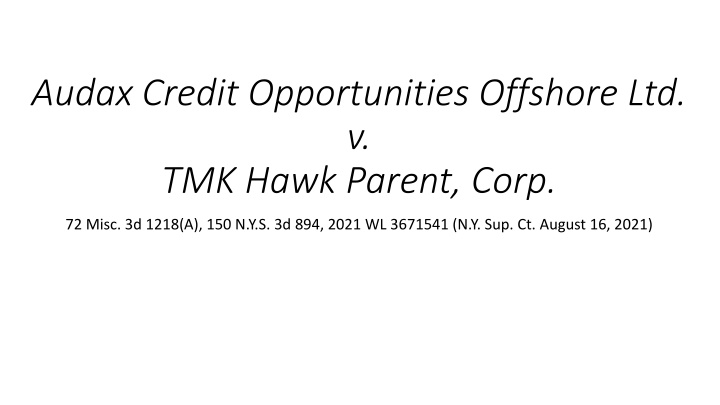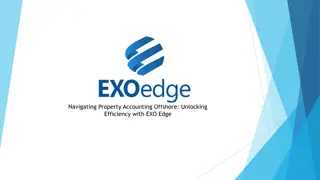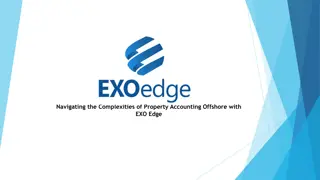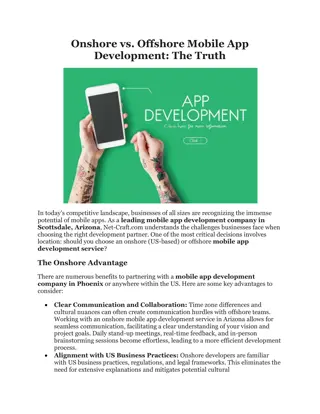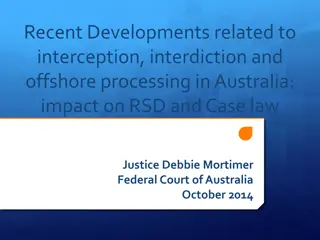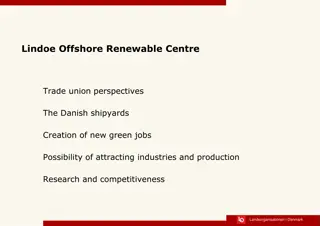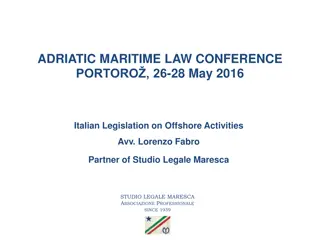Audax Credit Opportunities Offshore Ltd. v. TMK Hawk Parent Corp. (2021) Case Overview
The case involved the amendment of a syndicated credit agreement, leading to a conflict between minority and majority lenders due to the subordination of some lenders without consent. The process of "uptiering" resulted in discontent among the lenders, ultimately leading to a lawsuit. The court denied the motion to dismiss the declaratory judgment claim but dismissed other claims.
Download Presentation

Please find below an Image/Link to download the presentation.
The content on the website is provided AS IS for your information and personal use only. It may not be sold, licensed, or shared on other websites without obtaining consent from the author.If you encounter any issues during the download, it is possible that the publisher has removed the file from their server.
You are allowed to download the files provided on this website for personal or commercial use, subject to the condition that they are used lawfully. All files are the property of their respective owners.
The content on the website is provided AS IS for your information and personal use only. It may not be sold, licensed, or shared on other websites without obtaining consent from the author.
E N D
Presentation Transcript
Audax Credit Opportunities Offshore Ltd. v. TMK Hawk Parent, Corp. 72 Misc. 3d 1218(A), 150 N.Y.S. 3d 894, 2021 WL 3671541 (N.Y. Sup. Ct. August 16, 2021)
This case involved the amendment of a syndicated credit agreement which left a portion of first lien lenders subordinated without their consent; This process, known as uptiering, consists of the following: (1) a borrower persuades the barest majority of lenders to amend the credit agreement to allow for issuance of new debt; and (2) in turn, this bare majority of lenders obtain a super priority lien on the previously pledged assets; End result is that the borrower gets additional funding; this bare majority of lenders gets a super priority lien on assets and minority of first lien lenders are primed on their collateral;
In Audax, the minority lenders sued their co-syndicated members, alleging that this transaction was a cannibalistic assault, constituted lender-on-lender violence and outright theft; Plaintiffs sought a declaratory judgment that this uptier transaction was void; Also asserted claims for breach of contract and breach of the implied covenant of good faith and fair dealing. Defendants moved to dismiss the complaint; The Audax court denied the motion to dismiss the declaratory judgment claim and dismissed the remaining claims, including the claim for breach of the implied covenant of good faith.
In so doing, the Audax court found that the amended loan agreement violated plaintiffs sacred rights under 9.02[b][i] of the Credit Agreement without their consent; Section 9.02 [b][i] provided that [N]o such agreement shall . without the written consent of each lender directly and adversely affected thereby: . (D) waive, amend, or modify (i) Section 7.03 or (ii) Section 4.02 of the Collateral Agreement in a manner that would by its terms alter the order of application of proceeds . ; Section 4.02 of the Collateral Agreement set up a waterfall among the constituents in the Credit Agreement. However, as noted by the Audax court, the Amended Credit Agreement modified section 4.02 of the Collateral Agreement by making the waterfall set forth therein subject to the defendants super priority claim.
While denying the motion to dismiss the declaratory judgment, the Audax court dismissed the implied covenant of good faith and fair dealing claim. Court found that under NY law, a claim for breach of the implied covenant of good faith will be dismissed if it relies on the same facts that form the basis for the breach of contract claim and seek[s] the exact same damages. Audax, 2021 WL 3671541, *13 (citations omitted)
North Star Debt Holdings, L.P. v. Serta Simmons Bedding, LLC No. 652243/2020, 2020 WL 3411267 (N.Y. Sup. Ct. June 19, 2020)
In this case, the plaintiffs moved for a TRO and preliminary injunction seeking, among other things, to enjoin the defendants from implementing a refinancing transaction; As part of this transaction, 50.1% of the first lien lenders would make a new $200 million loan to Serta; Serta would then do a debt-for-debt exchange on a pro rata basis with these lenders pursuant to which these lenders would swap, at a discount, their prior debt for new loans issued under a new credit facility; The 50.1% majority lenders would then use their power to effectuate amendments to the original credit agreement that would give priority to the new credit agreement and the liens to be granted thereunder.
Although the court granted the plaintiffs request for a TRO, the court eventually denied the request for a preliminary injunction; In so doing, the court found that the plaintiff s breach of contract claim would not survive a motion to dismiss as: (i) the credit agreement permitted a debt-for-debt exchange on a non-pro rata basis as part of an open market transaction; (ii) the credit agreement also permitted a simple majority of lenders to amend the credit agreement and, as such, unanimous consent was not required; Court also found that the plaintiffs implied covenant of good faith and fair dealing claim also would fail as a matter of law as it was essentially duplicative of the plaintiffs breach of contract claim;
Finally, court also found that the plaintiffs did not establish irreparable harm, especially since money damages were available to plaintiff.
BAYSIDE CAPITAL INC. AND CERBERUS CAPITAL MANAGEMENT, L.P. v. TPC GROUP, INC. (In re TPC GROUP, INC.) No. 22-10493 (CTG), 2022 WL 2498751 (Bankr. D. Del. July 6, 2022)
In this case, the court described the transaction at issue as somewhat less aggressive than the paradigmatic uptier transaction, see 2022 WL 2498751 at *1; In 2019, the TPC Group debtors issued $930 million in senior notes, bearing interest at 10.5%; these notes were secured by a first lien on substantially all of the debtors assets (save for certain assets such as inventory and A/R, which secured an asset based lending facility); In 2021, the debtors needed additional liquidity and, as such, issued $153 million in new notes, bearing interest at 10.875% and then another $51.5 million of notes in 2022 (also bearing interest at 10.875%); The parties intended that the 10.875% notes would be secured by the same collateral as the 10.5% notes but that the 10.5% notes would be subordinate to the newer notes.
In order to accomplish this, the parties needed to amend the 2019 indenture. However, unlike the Serta case, the majority of the holders of he 10.875% notes also held a majority of the 10.5% notes and, as such, they had the right to amend the 2019 indenture in any way that did not violate a holders sacred rights set out in 9.02(d) of the [2019] indenture; 2022 WL 2498751 at *5; Eventually, TPC and various of its affiliates filed for bankruptcy; In the bankruptcy case, Debtors wanted to enter into a new DIP facility pursuant to which the debtors would get $85 million in new financing but the $238 million due and owing under the 10.875% notes would be rolled up into the DIP;
Bayside Capital Inc. and Cerberus Capital Management, L.P., who collectively held approx. 10% of the 10.5% notes, challenged the DIP loan by filing an adversary proceeding seeking a declaratory judgment that the 10.875% notes were junior to the 10.5% notes; After reviewing the terms and conditions of the 2019 indenture, the TPC court found that the 2019 indenture permitted a subordination simply by a majority vote and that there is nothing in the law that requires holders of syndicated debt to behave as Musketeers. Id. at 28.
DROP DROP- -DOWN RESTRUCTURING TRANSACTIONS DOWN RESTRUCTURING TRANSACTIONS Under this approach, a borrower transfers collateral out of the reach of existing lenders and places such collateral in a wholly-owned subsidiary; The subsidiary would then use this collateral to obtain new financing from some but not all of senior lenders; Exemplified by J. Crew in 2016; Senior lenders complained that they were J. Crewed and challenged the transaction; Following the lawsuit, J. Crew sweetened the deal and eventually 88% of the lenders consented to the transaction; As such, lawsuit basically ran out of steam due to overwhelming creditor support.
REVLON In 2019, Revlon tried to do a similar J. Crew transaction by transferring its intellectual property to a new subsidiary; Subsidiary then leased back the IP to Revlon operating entities and also used the assets to obtain $200 million of new financing; Following this, Revlon again tried to use the transferred IP to obtain an additional $900 million in new financing (using $200 million to pay off prior $200 million loan); The new facility would also roll up $950 million of debt under the initial credit agreement with the participating lenders obtaining 2ndand 3rdliens on the IP; Under the credit agreement, these transactions required the consent by a majority of the lenders;
In order to prevent this, a group of more than 50% of the senior lenders banded together to challenge Revlon s plans; To counter this, Revlon issued new unfounded revolver commitments essentially to dilute the majority group challenging the transactions; Revlon strategy worked and as a result of the new debt issuances the amendments passed (by less than half a percent); Aggrieved majority lenders filed suit (No. 20-cv-06352) contending that the transactions breached the terms of the loan agreement; violated the implied covenant of good faith and fair dealing, and that the transfer of the IP was a fraudulent transfer; However, following the lawsuit, the aggrieved lenders were actually paid in full, albeit by mistake, thereby ending the lawsuit; Administrative Agent sued to recover the erroneous payments (No. 20-cv-6539), lost at District Court level but was successful at the Second Circuit; The suit to recover the erroneous payments was dismissed after all creditors signed an agreement to return the funds; The lawsuit filed by the aggrieved lenders was later voluntarily dismissed without prejudice by the plaintiffs.
In October 2022, a group of the aggrieved lenders filed an adversary complaint against Revlon (No. 22-01167) asking the Bankruptcy Court to declare the financing transactions void ab initio for the same reasons alleged in the prior suit; In December 2022, Revlon filed a motion to dismiss and asserted counterclaims against the lenders; Revlon argued that the 2019 transfer of the intellectual property and licensing of such collateral was not a lease and therefore did not violate the credit agreement; Revlon asserted that the aggrieved lenders previously sought to enter into an identical transaction and only opposed the transaction because they wanted to force Revlon into bankruptcy and take control of the company; Revlon also argued that the revolver commitments were not a sham and served a legitimate business purpose; The Bankrtupcy Court has not yet ruled on the motions to dismiss.
ICG Global Loan Fund 1 DAC, et al. ICG Global Loan Fund 1 DAC, et al. v. v. Boardriders, Inc., et al. Boardriders, Inc., et al. Sup. Ct., NY County, Index No. 655175/2020, Docket No. 159
Another case involving uptiering; In this case, the defendants (who consisted of lenders holding approximately $321 million in first-lien debt) entered into several agreements, the net effect of which was to enable the Borrowers to obtain an additional $110 million of new financing, which would have super-priority lien treatment over existing first lien lenders; In order to effect this transaction, Defendants entered into a Second Amendment to the Credit Agreement as well as a Second Lien Intercreditor Agreement which permitted this borrowing and granted the super priority lien treatment; Additional provisions of the Credit Agreement were eliminated in their entirety, thereby, facilitating the the uptier transaction and the granting of the super- priority lien.
Following entry into these agreements, the Plaintiffs, who consisted of lenders holding approximately $85 million of the First Lien debt, sued in New York State Court; In their lawsuit, the Plaintiffs alleged several causes of action; The first claim was a contract claim for the defendant s breaches of the Credit Agreement; the second claim was a claim for the breach of the implied duty of good faith and fair dealing; the third claim was a declaratory judgment action seeking, among other things, that portions of the Second Amended Credit Agreement were unenforceable; Plaintiffs also asserted a tortious inference claim against Oaktree Capital for allegedly spearheading this uptier transaction.
Defendants moved to dismiss the complaint on a variety of theories including the plaintiffs lack of standing; In particular, the Defendants asserted that the plaintiffs lacked standing to bring these claims as they failed to act through the Administrative Agent and failed to post a cash bond, all of which were required pursuant to the amended credit agreement; Court rejected this conclusion; Citing the Audax Credit Opportunities case, the ICG Global court found that the plaintiffs sufficiently alleged that the credit agreement was amended in bad faith to prevent plaintiffs from being able to sue to enforce their rights and, as such, the plaintiffs had standing to bring suit.
However, unlike the Audax Credit Opportunities court, the ICG Global court also denied the defendants motion to dismiss the breach of implied covenant by good faith and fair dealing, finding that an explicitly discretionary contract right cannot be exercised in such bad faith as to deprive the other party of the benefit of the bargain ; Court granted Oaktree s motion to dismiss the tortious interference claims as the plaintiffs failed to allege that Oaktree s actions (while maybe not indicative of good faith) were neither fraudulent or illegal under NY law, pre-requisites to the viability of such a claim; Both sides have appealed the Court s order.
